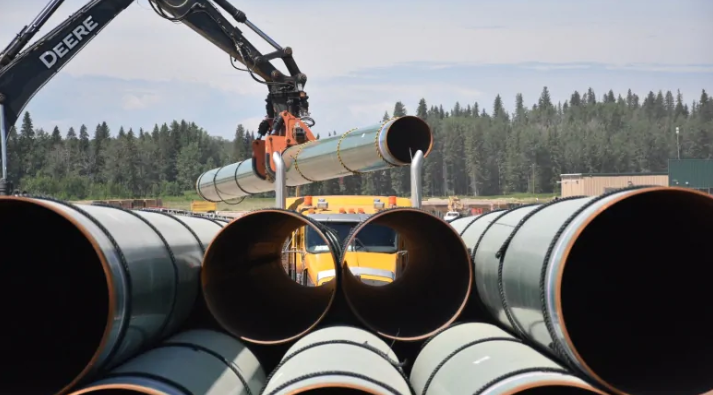
$3M will go to Crown corp’s executives and $2.48M to employees in 2021
Months before the Trans Mountain pipeline expansion project was approved a second time, the leadership of the new government-owned pipeline company approved $5 million in future bonuses for top executives and employees to keep them onboard.
At a 2018 board meeting a week before Christmas, while the fate of the Trans Mountain expansion project was still up in the air, the board of Trans Mountain Corporation unanimously approved a package of bonuses for its executives and non-executives as an incentive for them to remain with the company through 2021.
Trans Mountain Corporation CEO Ian Anderson and nine other members of the executive management team will share $3.01 million as part of the long-term incentive plan, according to documents obtained by CBC News under Access to Information.
It’s not clear from the board minutes how much each executive will receive, or if the money will be shared out equally. Another 81 non-executive members are also eligible for a piece of another $2.48 million in bonuses.
The minutes show that while the incentives were approved in 2018, they’ll be paid in 2021 — after the expected completion of the Trans Mountain pipeline expansion.
Executives and employees would need to meet the following four benchmarks to receive the bonuses:
- The National Energy Board and cabinet must approve the pipeline by June. (That’s already happened).
- The pipeline must remain in a state of readiness.
- The company must meet and exceed its health, safety and environmental targets.
- The project must stay on schedule and on budget.
Trans Mountain says bonuses ‘consistent’ with private sector
The bonuses land on top of $3 million in retention bonuses announced about a year ago for Anderson and executive vice president David Safari.
Anderson, the former president of Kinder Morgan Canada Ltd., remained as head of the Trans Mountain expansion project after the government announced it would purchase the pipeline for $4.5 billion in May 2018.
The Federal Court halted construction of the pipeline in August 2018 after it found the impact of increased tanker traffic off the B.C. coast wasn’t properly considered and consultation with Indigenous communities was insufficient.
The National Energy Board completed its second review in February and issued 16 new recommendations. The federal government also conducted new consultations with First Nations and Métis communities and the government re-issued its approval of the pipeline expansion in June.
Trans Mountain Corporation spokesperson Ali Hounsell defended the bonuses, saying they’re comparable to those offered in the private sector.
“Trans Mountain’s leadership team is charged with the critical functioning of the pipeline and assets and ensures it is operated in a safe and efficient manner,” Hounsell wrote in an email to CBC News. “Trans Mountain was acquired as an operating company from the private sector and has a leadership team functioning with compensation that is consistent with the industry.”
Criticism from opposition parties
Conservative pipeline critic Shannon Stubbs, a fierce opponent of the Liberals’ handling of the pipeline project, said the federal government needs to be transparent about every aspect of construction and operation.
“They made Canadians owners of the pipeline,” Stubbs said last week. “They need to be clear with Canadians on the timeline for construction, when it will be in service and about all of the costs to taxpayers, and that includes compensation to executives and bonuses like this that Canadians never receive in their jobs.”
NDP Leader Jagmeet Singh condemned the “hypocrisy” of paying bonuses to pipeline executives.
“This really shows who will profit from this project. Once again, the richest and the powerful will receive bonuses while the rest of Canadians will pay the price of (Justin) Trudeau’s climate hypocrisy,” Singh said in an emailed statement. “Not only will Canadians have to pay the price of the impact on the environment of this pipeline, but now they will be on the hook to pay for those bonuses.”
Analyst: You get for what you pay for
Richard Masson, an executive fellow with the University of Calgary School of Public Policy who has worked in the oil and gas sector, said the compensation looks comparable to bonuses offered by other pipeline and utility companies. Masson said that if Canada wants top talent to get the pipeline built, it needs to pay top dollar.
“It’s a competitive marketplace. We compete with the U.S. and other big markets for talent,” he said. “They’re attempting to build a multimillion-dollar project, which is one of the more complex ones we have in Canada, working with many stakeholders, First Nations, regulators. And eventually, the federal government wants to sell this pipeline back to the private sector.
“So, for a period of time, that compensation that the public sector gets will be higher than a lot of public sector agencies.”
Masson cited the compensation Anderson earned in 2017: $2,268,453 in salary, bonuses and other related compensation, according to Kinder Morgan Canada’s financial documents.
The Trans Mountain expansion will triple existing pipeline capacity to carry almost 900,000 barrels per day of bitumen from Alberta to B.C.’s coast. It will increase tanker traffic off B.C.’s coast from five to 34 tankers a month. The pipeline will directly produce 400,000 tonnes of greenhouse gas emissions, which has been factored into Canada’s and Alberta’s oilsands emission caps.


